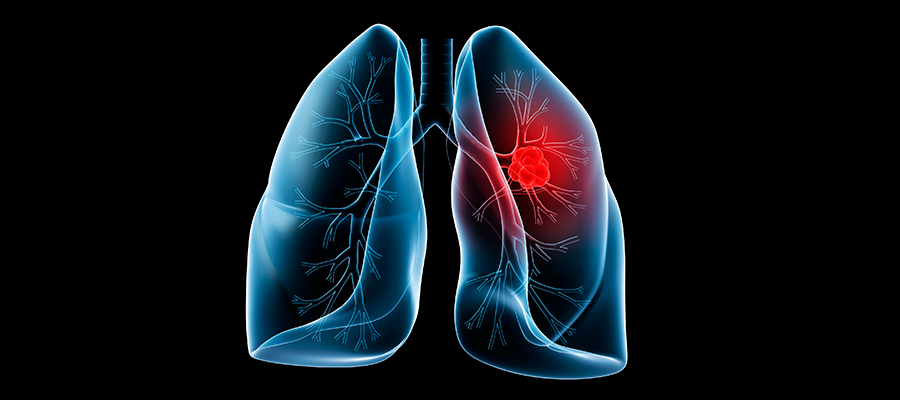New EORTC non-small cell lung cancer study to explore genetics of EGFR mutation
14 Apr 2014
There were an estimated 410,000 new cases of lung cancer and 353,000 deaths from lung cancer in Europe in 2012. This makes lung cancer the fourth most common cancer site (after female breast, 464,000 cases, colorectal, 447,000 cases, and prostate, 417,000 cases) but the leading cause of cancer death in Europe. It is a frequent and deadly disease.
Non-small cell lung cancer (NSCLC) is the most common type of lung cancer accounting for 85% of all lung cancer cases, and although numerous studies have documented a higher risk for developing NSCLC among smokers, non-smokers also develop lung cancer. This suggests that there are additional risk factors involved in developing this disease. It is thought that both somatic gene mutations (mutations that can occur in the cancer), as well as germline gene mutations (mutations that are inherited), contribute to NSCLC carcinogenesis.
Somatic epidermal growth factor receptor (EGFR) mutations occur more frequently in females and in East Asian patients. Therefore, the EORTC 08114-GEM intergroup translational research-observational study is designed to explore the underlying genetic factors associated with development of EGFR mutant NSCLC. The study seeks to catalogue the distribution of somatic EGFR mutant genotypes in 1,000 EGFR mutant NSCLC cases and describe their relationship to clinical outcome, identify germline DNA variants associated with somatic EGFR mutations in NSCLC, to correlate their relationship with survival, and finally to investigate germline DNA variants associated with development of NSCLC in this cohort of predominantly never/ex-light smokers.
Dr. Sanjay Popat of the Royal Marsden Hospital – Chelsea, London, and Coordinator of this trial says, “We are developing a good understanding of the molecular events that drive lung cancer. The best characterized of these is somatic EGFR mutation. Still, the genetic reasons why EGFR mutations occur in lung cancer, predominantly in never smokers, females, adenocarcinomas, and in East Asian patients are not well understood. So, this study will enroll patients with somatic EGFR mutant lung cancer, and a best “environmentally matched” control population of patients without the EGFR mutation, aiming to identify DNA variants associated with development of the EGFR mutation, and to assess their possible influence on patient survival.”
The EORTC intergroup 08114-GEM trial plans to accrue a total of 2000 patients. The Case Group will comprise 1,000 patients with EGFR mutant NSCLC, and the Control Group will comprise 1,000 patients with EGFR wild type NSCLC who either never smoked or are ex-light smokers. It will be conducted in more than 50 sites in several countries including Belgium, Egypt, Greece, Poland and the United Kingdom (UK). This trial is led by the EORTC Lung Cancer Group in collaboration with the UK National Cancer Research Institute and Professor Mark Lathrop at the Genome innovation Centre, Quebec, Canada. This is an academic trial supported by the EORTC Lung Cancer Group without any support from industry.
For more information concerning EORTC trial 08114 please contact: www.eortc.org/contact
John Bean, PhD
EORTC Medical Science Writer
Related News
EORTC: Advancing research and treatment for rare cancers
29 Feb 2024
EORTC Fellowship Programme: celebrating more than 20 years of impactful collaboration
22 Feb 2024
Appointment of Malte Peters as EORTC Strategic Alliance Officer
9 Feb 2024
Unique series of workshops in partnership with the European Medicines Agency (EMA)
7 Feb 2024
EORTC launches a prominent clinical trial in older patients with locally advanced (LA) HNSCC (Head and Neck Squamous Cell Carcinoma)
14 Dec 2023
Seven IMMUcan abstracts selected for ESMO Immuno-Oncology Congress 2023
6 Dec 2023
EORTC Quality of Life measures integrated in CDISC
20 Nov 2023
EORTC and Immunocore are collaborating to launch the ATOM clinical trial of tebentafusp in Adjuvant Uveal Melanoma
7 Nov 2023
Treatment with decitabine resulted in a similar survival and fewer adverse events compared with conventional chemotherapy in older fit patients with acute myeloid leukaemia
31 Oct 2023
New results and forthcoming EORTC trials in rare cancers, lung, head and neck, and breast carcinomas presented at ESMO 2023
20 Oct 2023


